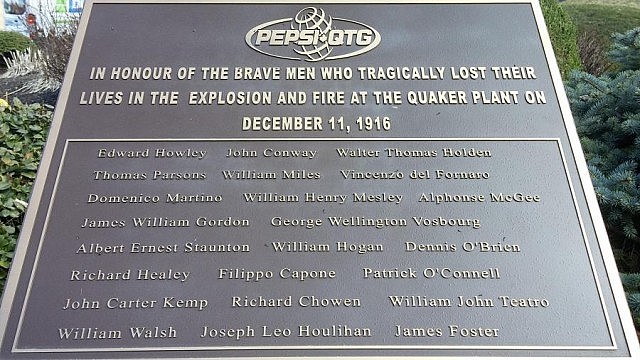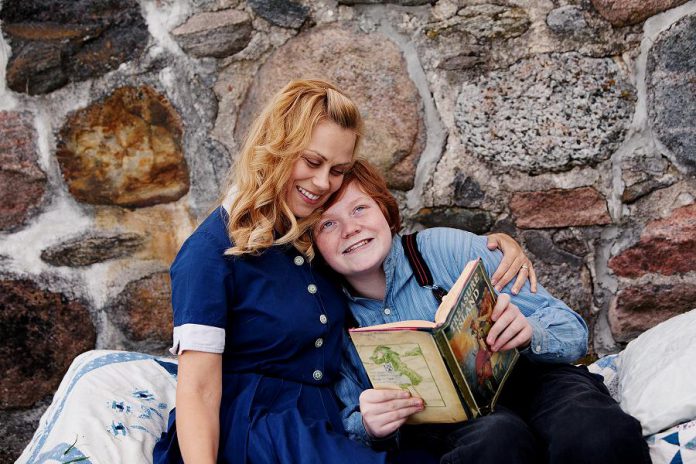
There’s a lot going on at the Winslow Farm right now, home of Millbrook’s acclaimed 4th Line Theatre. With three different scripts in development, the theatre company has been extremely busy. As the centre of it are rehearsals for The Hero of Hunter Street, 4th Line’s newest original production, which makes its world premiere this June.
Written by Maja Ardel and directed by Kim Blackwood, The Hero of Hunter Street focuses on the plight of one family in the aftermath of the Quaker Oats factory fire in 1916, one of Peterborough’s worst disasters.
The fire killed 24 men, threw another 500 out of work, and devastated an entire community.
4th Line Theatre uncovered the family history of one of the theatre’s volunteers, which provided the inspiration for the play.
“One of our volunteers, Lorna Green, approached us a few years ago and said ‘You might want to do something about the Quaker Oats fire,'” explains director Kim Blackwell.
“She talked to Robert Winslow and he agreed that it was a great idea. Lorna proceeded to tell us that her grandfather, Dennis O’Brien, and great grandfather, William Hogan, were both killed in the explosion and neither of their bodies were ever found.”
Their deaths had a profound impact on Lorna’s father, George O’Brien, who was just a little boy when his father and grandfather died.
“He used to ride his bicycle around Peterborough looking for his dad,” Kim says. “He’d see men from the back and think they were his father and he’d go up to them. It was so hard for people, especially during a tragedy like this, when they don’t have a body to bury. The O’Brien’s were Catholic so they couldn’t do the last rites or any of the things we do to bring closure so we can start to live again.”
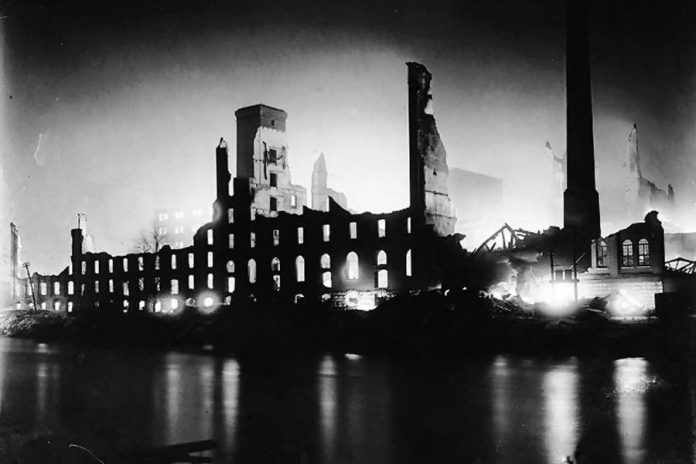
It’s the real-life family drama at the heart of the terrible tragedy that makes The Hero of Hunter Street so powerful.
“It’s not enough for theatre to just write about the tragedy,” Kim says. “You want to really put a human face to it. To have access to one of the families that had lost loved ones in the fire was a pretty extraordinary place to start.”
Kim enlisted award-winning playwright Maja Ardal to write the play’s script.
A Dora Award winner for her one-woman show You Fancy Yourself, Maja was also nominated for a Dora in 2011 for her play A Cure For Everything.
“Until The Hero of Hunter Street, much of Maja’s work has been autobiographical and personal”, says Kim, who had worked with Maja on her production of HER2 in 2015. “So we put Maja together with Lorna and that was the key. They really took to each other and Lorna helped Maja with a ton of research.”
The result of the collaboration was one of the best first drafts Kim has ever read.
“It captured the human personal story of the O’Brian family and their tragedy,” Kim says. “It captured Peterborough in 1916 with the social and political realities. Maja also captured the larger national and international scene of December of 1916. We were in the middle of World War I. Quaker Oats was feeding the men overseas, so there was a huge dent when this happened. People thought at first that it might have been terrorism and that the Germans had bombed Quaker Oats. Maja captured the time and the place and the people so perfectly.”
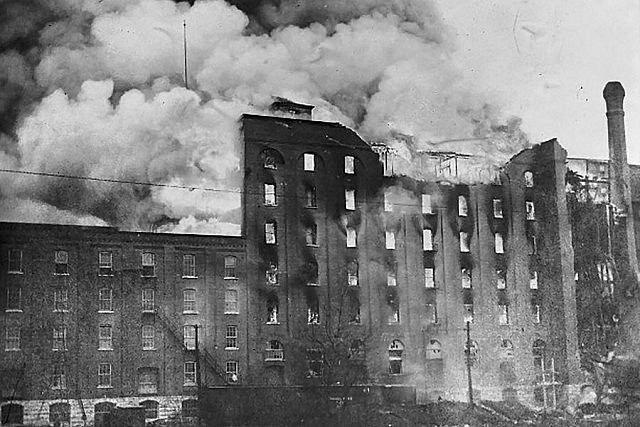
But that first draft took a turn as Maja continued to refine the script.
“One day Maja called me and said ‘Every time I write, they start singing'”, Kim explains. “I said, ‘Okay, we’ll go with that.’ So there are 15 songs in the play. We are calling it a play with music — it’s not really a musical. The songs are beautiful. Maja wanted to compose the music and she suggested a range and score. She wrote these beautiful songs; some of them are real anthems. You won’t be able to get them out of your head when you leave the theatre.”
With a cast of 44 actors and featuring 75 different characters, The Hero of Hunter Street features Monica Dottor as Laura O’Brien, Mac Fyfe as Dennis O’Brien, and Liam Davidson as George O’Brien.
“At the centre of this are Laura and Dennis O’Brien, their five children, and Laura’s father,” Kim says. “The play starts a few days before the fire, when the world was their oyster. It was right before Christmas, so everybody is excited about Christmas. The women are trying to figure out how to pay for it, and the men are working extra shifts at the factory to make sure there is a little extra something for the kids at Christmas time.”
“And then, at an unexpected moment at 10 a.m. on December 11th, some grain dust ignites in the factory and starts this catastrophic fire, killing 24 men and changing people’s lives forever.”
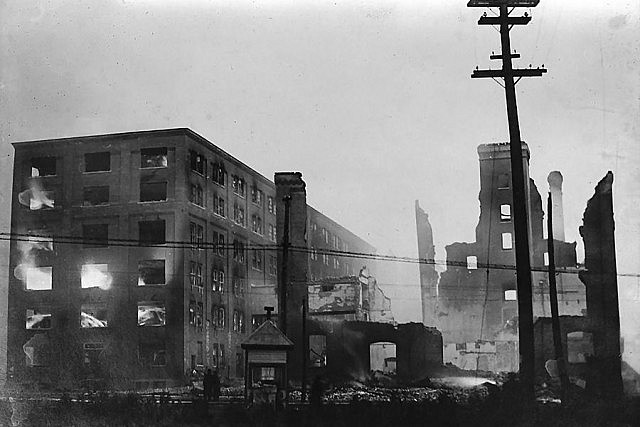
“It’s an epic piece, because it’s looking at the whole town,” Kim continues. “I want to create a look at life in downtown Peterborough on the afternoon of December 9th, 1916. Everyone is running around getting their last minute purchases done, and the shift has just ended and the men are leaving the factory. I want that sweep of scope and the epic feel of that.”
Mac Fyfe takes on a double role as Ajax the Strong Man, who is loosely based on Peterborough’s legendary strong man Daniel “Dan” MacDonald. MacDonald is one of the most famous inhabitants of Little Lake Cemetery and he’s also featured in the logo of Ashburnham Ale House on Hunter Street in East City.
Kim explains Mac’s role in the play.
“Ajax the Strong Man is passing through town and he’s supposed to be doing a show,” Kim says. “His claim to fame is that he can lift 15 men above his head with one hand. He’s supposedly the strongest man in Canada, and George enlists him to help him find his father. He becomes convinced that Ajax can life the walls of the destroyed factory and find his father buried under there.”
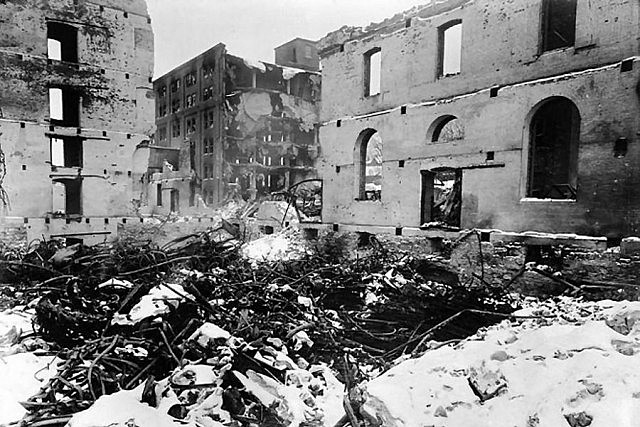
“He’s the heart of the story,” Kim says. “Here’s a non-professional kid actor who has just graduated from grade eight, and this show is carried on his shoulders. He’s wonderful. This guy is so talented and has such a big heart. I think people are just going to adore him on stage.”
With rehearsals just beginning, there’s still more than a month before The Hero of Hunter Street opens for a preview night on Tuesday, June 28th. However, the show has taken four years to develop.

“I think we’re all ready to share this show with an audience,” Kim says. “I have seen a draft and drawings of costumes, set drawings and maquettes. We’re ready to go. The next thing is just to bring it to life in the barnyard.”
Although The Hero of Hunter Street is based on one of the worst industrial accidents in Canada, Kim assures us the show also has a lot of humour and is ultimately about heroism, healing, and living. In the fashion of 4th Line’s tradition of bringing local history to life, it’s a tribute to the past while making sure that the stories of our community continue to be told.
“We can’t believe how much of an impact it has had, even 100 years later, on the descendants of the men who died,” Kim says.
“None of the people alive today knew anyone who died in the fire, but the effect it had on their parents or relatives has been imprinted on them in such a profound way that it still has ripples to this day.”
